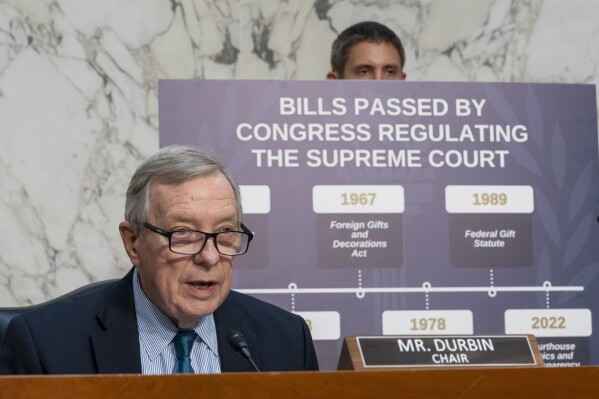Erdogan backtracks after siding with court that defied top court’s ruling on lawmaker’s release
ANKARA, Turkey (AP) — Turkey’s president on Friday backpedaled after siding with a top appeals court that defied a Constitutional Court ruling calling for the release of an imprisoned opposition lawmaker.
President Recep Tayyip Erdogan adopted a more neutral stance after voicing support for the appeals court and renewed his call for a new constitution to resolve the dispute.
This week, the high court of appeals declared that it would not abide by a Constitutional Court ruling that called for the release of Can Atalay, a lawyer and human rights activist who was elected to parliament in May while in prison. The court of appeals also took the unprecedented step of filing a criminal complaint against Constitutional Court justices, accusing them of violating the constitution.
The clash between the two high courts heightened concerns over the further erosion of the rule of law in the country where the independence of the courts is frequently questioned.
 Democrats postpone a subpoena vote in the Supreme Court ethics probe after a blowup with Republicans
Democrats postpone a subpoena vote in the Supreme Court ethics probe after a blowup with Republicans
 Apple hits setback in dispute with European Union over tax case
Apple hits setback in dispute with European Union over tax case
 Court cites clergy-penitent privilege in dismissing child sex abuse lawsuit against Mormon church
Court cites clergy-penitent privilege in dismissing child sex abuse lawsuit against Mormon church
In remarks published Friday, Erdogan accused the Constitutional Court - Turkey’s highest court - of making “many mistakes one after the other” and reproached members of his own party who criticized the appeals court.
Hours later, Erdogan tempered his position, saying his government would strive to resolve the dispute.
“We are not a party to the judicial dispute but a referee,” he said.
The Turkish leader also argued that the dispute was further proof that the country needed a new constitution.
“Rather than looking at the dispute as to who is right or wrong, we look at it from the perspective of what needs to be done,” he said. “When we look at it from this perspective, we see the need to give our a country a new constitution.”
Erdogan has frequently argued for the drafting of a new constitution which he has said would uphold conservative family values. Critics fear that the increasingly authoritarian leader would use the new constitution to cement his powers.
On Friday, hundreds of members of the Turkish Bar Association marched to the Constitutional Court to protest the appeals court’s decision not to implement its ruling. The main opposition Republican People’s Party, or CHP, has described the move by the court of appeals as a “coup attempt against parliament.”
Atalay was convicted last year, along with seven other defendants, of attempting to overthrow the government for organizing nationwide protests in 2013. Atalay, who rejects the accusation, was sentenced to 18 years in prison. He won a parliamentary seat in general elections in May while serving the sentence.
The Constitutional Court, which reviewed his case last month, had ruled for Atalay’s release, saying his freedoms and rights to hold office were being violated.
This week the European Union’s executive branch released its annual report on Turkey’s EU membership bid, criticizing what it said were serious deficiencies in the functioning of the country’s democratic institutions, backsliding in the judiciary and deterioration in human and fundamental rights.
Disclaimer: The copyright of this article belongs to the original author. Reposting this article is solely for the purpose of information dissemination and does not constitute any investment advice. If there is any infringement, please contact us immediately. We will make corrections or deletions as necessary. Thank you.



